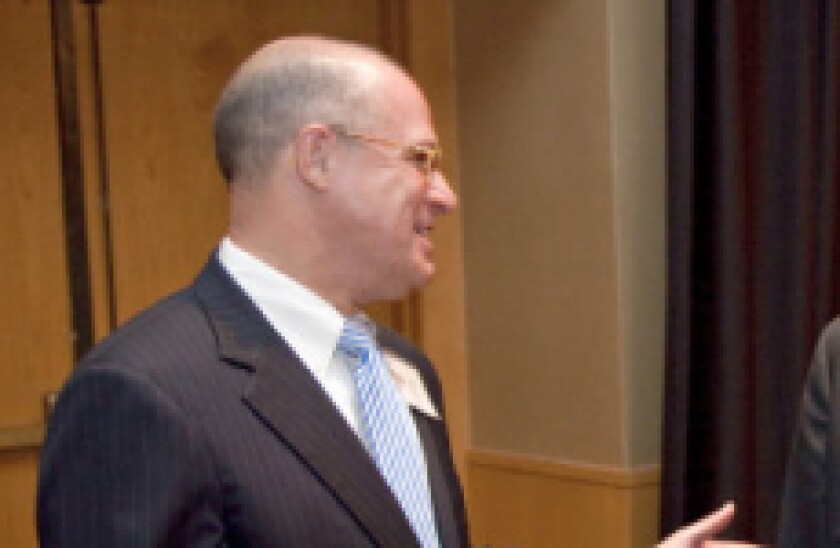In the wake of Donald Trump becoming US president-elect, market talk has traversed between bankers’ Christmases coming all at once – in the form of cuts to restrictive rules – and visions of chaos amid a wholesale slash-and-burn directive.
On both sides of this divide are big assumptions that regulatory change is coming to America, after Trump’s transition team said last week that it would “dismantle the Dodd-Frank Act and replace it with new policies to encourage economic growth and job creation”.
Some are expecting other upheavals, including the Commodity Futures Trading Commission and the Securities and Exchange Commission being rolled into one entity, with Republican CFTC commissioner J Christopher Giancarlo taking charge. Such speculation was given fuel on Monday, when SEC chair Mary Jo White announced that she intends to leave her post early, at the end of the Obama administration in January.
Again, such thoughts bring joy to bankers, given that regulatory efforts could often have been better co-ordinated between the agencies, and because Giancarlo has often been a dissenting voice on CFTC rule-making.
But it also raises questions over how far regulatory momentum will change, given that White’s leadership is credited with completing most of the SEC’s mandates under the Dodd-Frank Act and all of its mandates under the JOBS Act. Among initiatives she advanced were post-crisis restrictions on proprietary trading and investments by broker-dealers and other financial institutions through the proposed Volcker rule.
At least in the near term, however, both those celebrating the Trump win and those in mortal anguish should temper their views about the scale of change coming to financial markets.
To start with, taking on Dodd-Frank was not, as some market participants now suppose, one of Trump’s first 100 Day plan proposals. It is something that has been highlighted by the transition team — more properly named the ‘Financial Services Policy Implementation team’.
So while the “sprawling and complex piece of legislation that has unleashed hundreds of new rules and several new bureaucratic agencies” may well come under full-scale review after Trump takes office, it is unlikely to be top of his priority list.
But more importantly, anyone of law-making acumen looking at Dodd-Frank will know that steamrollering over the Act won’t bring domestic or global financial market stability.
Dodd-Frank’s four main pillars of derivatives market reform, for example – reporting, clearing, margining and swap execution facilities – are G20 commitments and have largely been put in place. Banks and investors worldwide have already made huge investments over years to comply with the rules and establish adequate systems. If the US unilaterally tears up such international agreements, it would create major disruption to business.
Trump himself might be all for the steamroller approach. But it’s more plausible that the transition team starts out with easing back areas of Dodd-Frank that go beyond G20 commitments, and areas where other countries have applied a less stringent regime than the US. Far from being disruptive, this might provide an opportunity to further align US rules with the international market and reduce any competitive disadvantages that the US faces versus other countries.
And it might do things to improve liquidity in the market — for example, by acknowledging that small end-user counterparties don’t really need to come under the scope of margin rules.
Goldman Sachs chief executive Lloyd Blankfein appears to have pointed to an approach along these lines. He said that it might be appropriate to repeal some aspects of Dodd-Frank, but that he wouldn’t “want to repeal it in toto”.
One element that banks will surely get behind scrapping once and for all is the proposed Volcker rule, which has already prompted an exodus of prop trading talent from banks to hedge funds. Texan Republican Representative Jeb Hensarling, who leads the House Financial Services Committee and is likely to hold sway with the Trump administration, called for as much earlier this year.
The constant in all of these discussions is likely to be Giancarlo. While many believe his approach could be more relaxed than that of the SEC and of his fellow CFTC commissioners Timothy Massad and Sharon Bowen, it is also worth bearing in mind that Giancarlo’s consistent mantra has been market stability over the regulatory imperative.
Following the rollout of initial margin rules on September 1 by the US, Canada and Japan, Giancarlo expressed dismay at regulators’ handling of the matter. This was not fundamental opposition to the rules themselves, but simply the lack of international co-ordination and the unpreparedness of banks to meet the requirements.
“These jumbled decisions confirm the failure of US and overseas regulators to co-ordinate the implementation of new margin requirements,” said Giancarlo at the time. “Worse, they leave US regulators going it mostly alone to the detriment of American financial firms, their employees and the American businesses they serve.”
It is most unlikely that Giancarlo would get behind any regulatory rollback that caused further domestic and international disruption of that kind. Whether the CFTC, which is alone among the financial regulatory agencies in not being able to self-fund, will have enough budget under Trump to keep a firm grip on market regulation in the long run may be another matter, but it is to be expected that there will be no great and sudden loosening of standards.
Irrespective of the political backdrop, in the run-up to March 1, Giancarlo will have his hands full trying to avert problems around the scheduled international rollout of variation margin requirements. Time is already fast running out for insurers and pension companies to be ready, and a delay or disaster on that front could quickly dent Giancarlo’s credibility if he is holding the reins.
As such, far from being a source for alarm or delirium — yet — market participants should see the Trump transition as a generational opportunity. There is every chance to affect helpful changes to markets without hubris and without the political embarrassment of a party U-turn. It is for everyone to get involved quickly and help shape a market that truly does work better for everyone, from the big to the small.







